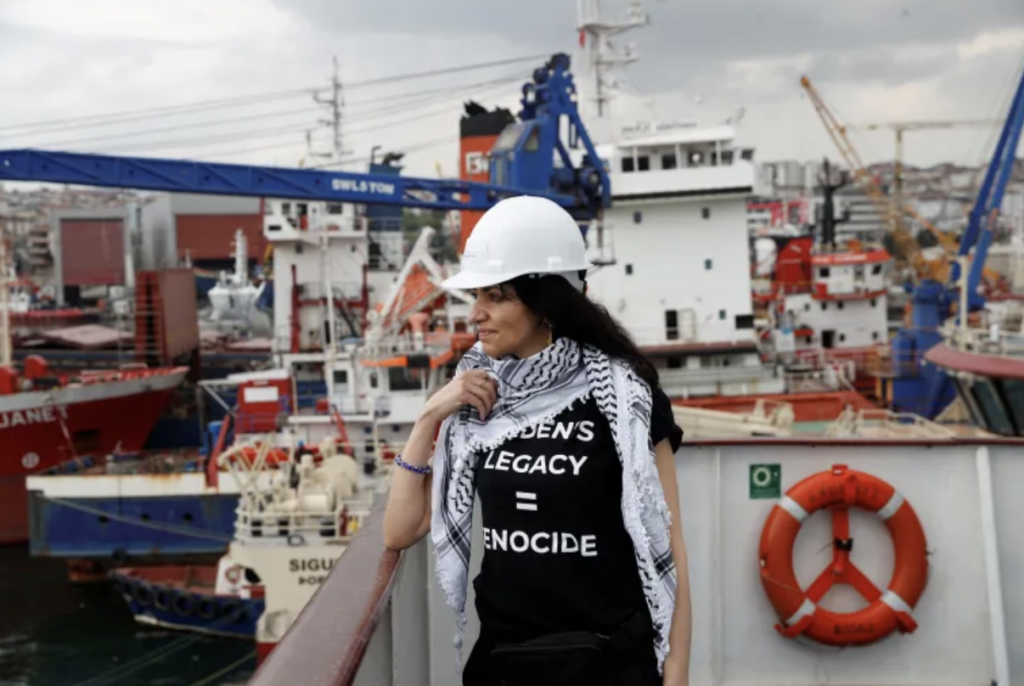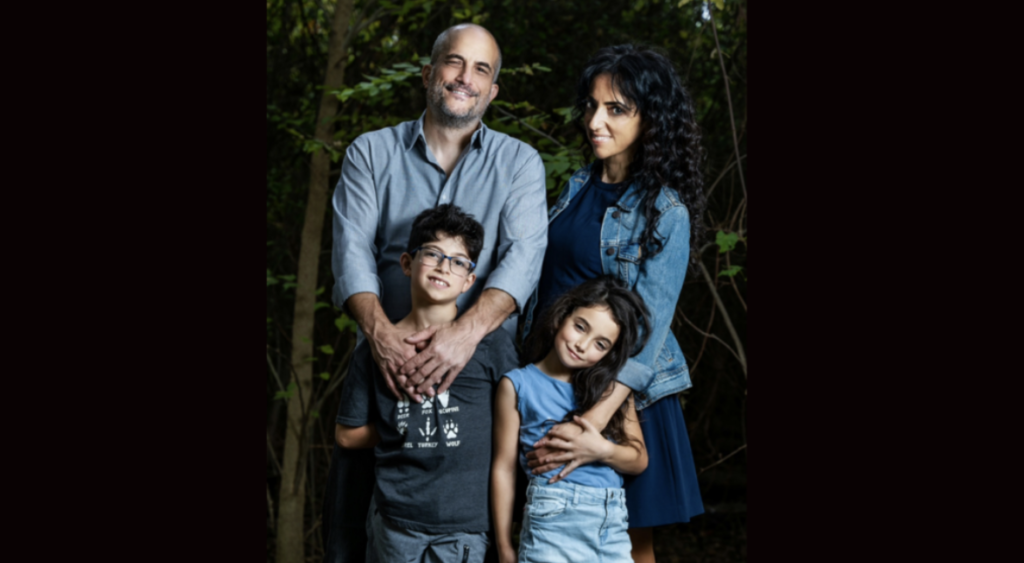Pathbreakers of Arab America—Huwaida Arraf

By: John Mason / Arab America Contributing Writer
This is the forty-fourth of Arab America’s series on American pathbreakers of Arab descent. The series includes personalities from entertainment, business, sports, science, academia, journalism, and politics, among other areas. Our forty-fourth pathbreaker, Huwaida Arraf, an activist and attorney who, as a Palestinian American and a Palestinian Arab citizen of Israel, endeavored to moderate her dual loyalties. Born in Detroit, Arraf’s mother was a West Bank Palestinian, and her father was a Palestinian from northern Israel and thus an Israeli citizen. One motive for their move to the U.S. was to remove Arraf from the violence in the West Bank.
Born to mediate Palestinian-Israeli relations, Huwaida Arraf, an honest culture broker and key member of the peace movement
Born in Detroit in February 1976, Huwaida’s parents took her to Palestine every few years until she was ten years old. The purpose of these visits was presumed to be to introduce their daughter to the heritage of her homeland. Because of her dual Israel-U.S. nationality, Arraf’s destiny seemed to be one of the cultural broker of Palestinian-Israeli relations.
In pursuit of her goal as a mediator of the two cultural worlds, Huwaida, per Wikipedia, triple majored in Arabic, Judaic studies, and political science at the University of Michigan. She then spent a year at the Hebrew University in Jerusalem and studied Hebrew on a kibbutz. Arraf followed her Michigan degree with a Juris Doctor from American University’s Washington College of Law. There, she focused on international human rights and humanitarian law, with a particular interest in war crimes prosecution.
As a law student, Arraf conducted research for the Public International Law and Policy Group, which provides pro bono legal assistance to governments involved in conflicts. Arraf also worked with the International Human Rights Law Clinic at the Washington College of Law, where she represented clients before the Inter-American Commission on Human Rights on issues ranging from indigenous land rights to cross-border abductions and irregular rendition. Arraf focused on disadvantaged people, especially those whose land rights were at issue.
Huwaida is reported in a Jewish Telegraphic Society story to have said, “She wanted to expose herself to all points of view. I was thinking at the time, that maybe I can get into diplomacy and try to play a role in bringing the two sides together. And then if I was going to do that, I’d want to obviously understand the Israeli side better.” That included learning Hebrew. So, as part of her early quest for understanding, Arraf lived on a kibbutz in Israel, something that she was able to do as an Israeli citizen. “I cherish that time,” she said. When she returned to the University of Michigan, she established a Jewish-Palestinian dialogue group.
Arraf then moved to Jerusalem as program coordinator for Seeds of Peace, which at the time focused on bringing Jews and Arab youth from the Middle East together for dialogue. Arraf enjoyed arranging the encounters, and through the organization, she met Adam Shapiro, the group’s Jewish acting director at the time. She and Adam later married. The experience with Seeds for Peace “essentially ended her ambitions to become a diplomat: Arraf concluded that Seeds of Peace was a “feel-good project” that ultimately harms the pro-Palestinian cause.” It ignored the larger, consequential context of Israeli hegemony over the Palestinians.
Together, Arraf and her husband, Adam, in April 2001 formed The International Solidarity Movement (ISM). It is a Palestinian-led movement committed to resisting what it terms “the long-entrenched and systematic oppression and dispossession of the Palestinian population, using non-violent, direct-action methods and principles.” Its thrust was to focus international attention on the oppression of the Palestinians.

Since its creation, Wikipedia reported, over 10,000 volunteers from dozens of countries have joined the ISM to monitor human rights abuses in occupied Palestine. In 2003 and 2004, the organization was nominated for the Nobel Peace Prize. ISM eventually incorporated the Gaza Freedom Flotilla initiative, a series of groups of ships carrying pro-Palestinian activists that were organized to break Israel’s naval blockade of the Gaza Strip.
Huwaida was aboard the 2008 Free Gaza boats as well as the 2010 flotilla that was raided by Israeli commandos on May 31. Using a satellite phone on board, Arraf stated that they planned to have the boats keep heading toward Gaza “until they either disable our boats or jump on board.” At the time of the raid, Arraf was aboard the Challenger 1, one of the smallest boats of the flotilla. Arraf resigned from this position in October 2012 after a new board was approved.
Some years later, Huwaida then decided to run for a Congressional seat in Michigan. She was described as, “Now running for Congress in Michigan: a Hebrew-speaking Palestinian Christian who is married to a Jew and spent time living on an Israeli kibbutz before rejecting coexistence efforts in favor of advocating for Palestinian resistance.” Furthermore, Arraf “has alarmed Detroit-area Jewish and pro-Israel groups with her plans to enter a crowded Democratic field ahead in the August 2022 primary in Michigan’s 10th Congressional District.”
Huwaida’s campaign was characterized by the Michigan-based Jewish Community Relations Council of the American Jewish Committee as “hateful, destructive, and antisemitic.” She had condemned antisemitism in pro-Palestinian advocacy and says she encourages Jews to approach her with any questions and not to believe everything they read about her. “Know that I will always stand for people’s rights,” she said. “And when we come together to defend the rights of all people — not really based on ethnicity or religion — we will find ourselves on the same side.” She did not win that election.
Around the time of Arraf’s run for Congress, a smear campaign was launched against her because of a speech she delivered at a high school event in Detroit, Michigan. It was part of a day-long event on diversity and equity at Bloomfield Hills High School. As reported by Middle East Eye, “Huwaida Arraf has been the subject of a relentless media campaign following her appearance.” Her speech told of her “growing up here in the US, why I decided to move to Palestine, and the work that I was involved in, which essentially is grounded in the fight against racism and discrimination – the theme of the assembly.”
A huge kerfuffle arose over Arraf’s speech, mainly because the Jewish participants felt blindsided, reading into her speech an “antisemitic” strain. The usual trope of antisemitism was used to accuse her because she expressed a pro-Palestinian stance. A more balanced view of the event was that “By attacking an outspoken advocate like Huwaida, right-wing Israel lobby groups are attempting to create a chilling atmosphere where students and faculty will be afraid of backlash for speaking out in favor of Palestinian rights.”
Pro-actively pro-Palestinian, Huwaida now finds the Israeli-Palestinian rift almost too deep to bridge
A more recent expression of Huwaida’s pro-Palestinian stance is her participation in the late-April 2024 ‘Freedom Flotilla’ departure from Turkey for Gaza. Al-Jazeera reported, “The Freedom Flotilla has left Gaza with the aim of breaching the blockade of Gaza.” A flotilla of ships set to depart for the Gaza Strip on Friday to bring aid to Palestinians has been stranded in Turkey due to administrative roadblocks, as organizers say Israel has been exerting political pressure to impede the voyage.”

Al-Jazeera reported, “Palestinian-American activist and international lawyer Huwaida Arraf has left her nine-year-old daughter and 11-year-old son behind to board the Freedom Flotilla, headed for the Gaza Strip on a mission to bring aid to Palestinians and break through an Israeli blockade on humanitarian access to the war-torn enclave. My husband told me the other day that my daughter asked him: ‘What happens if Mama dies? Would it be ok if this was going to help people? Sadly, she has to think about that, but that’s the world we live in and that’s not the world I want to pass on to them.’”
So far, the Gaza Freedom Flotilla along with its activists has been blocked from sailing to Gaza by Israel and a few Western countries. However, they vow to continue to break the siege.
So, Arraf, after decades of effort to bridge the Israel-Palestinian rift, has now gone full force to protect the people of Gaza from more deaths, starvation, displacement, and the other awful effects of the Israel-Hamas war. She deserves a lot of credit for her earlier, culture broker role, but it is understandable that when that plan didn’t work, another, more radical plan would have to take its place. Huwaida’s shift is nothing if not understandable. Furthermore, it is for many admirable.
Sources:
–-“Huwaida Arraf,” Wikipedia Biographies of Arab Americans, 2024
–“For years she led Palestinian resistance efforts. Now Huwaida Arraf wants a seat in Congress,” Jewish Telegraphic Society, 2/23/2022
–“How a Palestinian activist’s appearance at a US school triggered a smear campaign,” Middle East Eye, 3/31/2023
–“Israeli pressure delayed Freedom Flotilla’s departure for Gaza: Organisers,” Al-Jazeera, 4/26/2024
John Mason, Ph.D., focuses on Arab culture, society, and history and is the author of LEFT-HANDED IN AN ISLAMIC WORLD: An Anthropologist’s Journey into the Middle East, New Academia Publishing, 2017. He has taught at the University of Libya, Benghazi, Rennselaer Polytechnic Institute in New York, and the American University in Cairo; John served with the United Nations in Tripoli, Libya, and consulted extensively on socioeconomic and political development for USAID and the World Bank in 65 countries.
The views and opinions expressed in this article are those of the author and do not necessarily reflect the position of Arab America. The reproduction of this article is permissible with proper credit to Arab America and the author.
Check out our Blog here!









